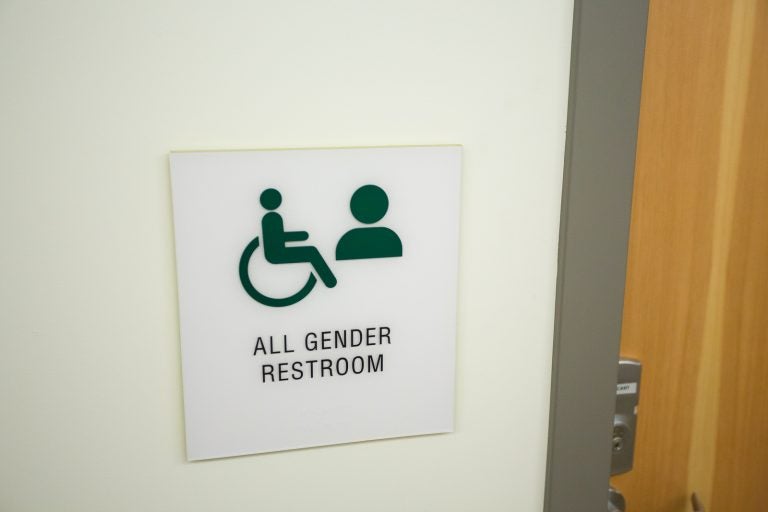Delay for anti-bias policy in Delaware schools
The proposal allows students to use the bathroom that aligns with their gender identity and pick a preferred name other than their birth name without notifying their parents.
Listen 1:31
A proposed anti-discrimination policy for Delaware schools would, among other provisions, allow students to use the bathroom that aligns to their gender identity. All gender restroom sign at a school. (Photo via Bigstockphoto)
Creation of a model statewide policy to guide Delaware’s 19 school districts in developing anti-discrimination regulations regarding issues such as gender identity, use of bathrooms and locker rooms, and participation on sports teams has been delayed until at least March 1.
The proposal, which allows students to use the bathroom that aligns with their gender identity and pick a preferred name other than their birth name without notifying their parents, has drawn more than 11,000 written comments from the public.
The proposed regulation was urged by Gov. John Carney this summer, unveiled in September, posted online and discussed at several community meetings. The proposal was endorsed last week by the state teacher’s union.
Carney’s move to protect Delaware’s 137,000 public school students from bias followed his administration’s modification in April of anti-discrimination policies in state government. Carney took office in January, a year after a group of religious and civil rights leaders released a report alleging racism, discrimination and retaliation in state government, especially at the Department of Labor in Kent and Sussex counties.
The schools’ regulation would require all districts to adopt their own policies that at a minimum meet the guidelines set by the state. The team hoped to have policies in place for all districts by the start of the 2018-2019 school year, but whether that can be accomplished by then is uncertain.
The public comment period ended Monday, leading Secretary of Education Susan Bunting to decide to reconvene a “development team” consisting of educators, school board members, parents and students in January to give “careful review’ to the comments and recommend any changes they deem appropriate.
Bunting, who announced the delay on Tuesday, would not agree to an interview, spokeswoman Allison May said. May said the department will be putting all the comments online in advance of the team’s January meeting, which has not yet been set.
Should substantive changes be made, officials said, the revised policy would be published online again and the public will again be given the opportunity to comment, which could further delay its adoption.
Mike Matthews, president of the Delaware State Education Association, said his organization supports the policy as it is.
“We have a diverse population of students inside of each public school in Delaware. We need to make sure that all students feel safe, secure, and supported when they enter the doors to their school. The proposed regulation can help do just that.” Matthews said.
The regulation “will help protect students against discrimination in our schools no matter their race, ethnicity, religion, gender identity, or sexual orientation.”
The union’s Ethnic Minority Affairs Committee also endorsed the proposed regulation.
“We are against discrimination of any kind. Therefore, we support what is in the best interest of all students in our schools” said panel chairwoman Karen Maull, a teacher at Cape Henlopen High School.
When Carney ordered the creation of a policy, the Democrat said: “I expect Delaware’s school districts to ensure that every student can attend school comfortably and without fear of discrimination – now and in the future. At the state level, we’re making sure that state agencies follow a consistent anti-discrimination policy. This will help our schools move in that same direction.”
The state spends about $1.2 billion annually – about one-third of the general fund budget, on Delaware’s public schools. That money pays about 60 percent of the cost of K-12 education in Delaware.
“It is critical that all schools in Delaware be welcoming, inclusive places where students and staff members alike can flourish,” Carney wrote to Bunting in July when ordering the policy.
“Our schools should be places where students are comfortable, embraced, and challenged to achieve great heights. Any practices that prevent this, whether purposeful or by accident, hinder our state’s progress.”
WHYY is your source for fact-based, in-depth journalism and information. As a nonprofit organization, we rely on financial support from readers like you. Please give today.





